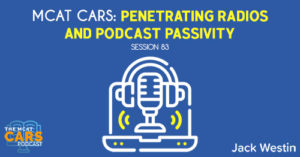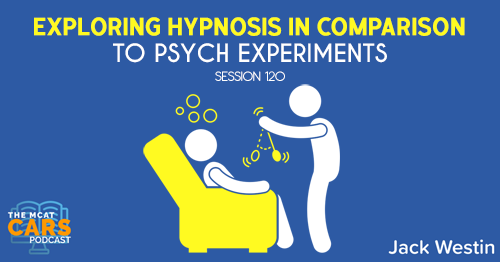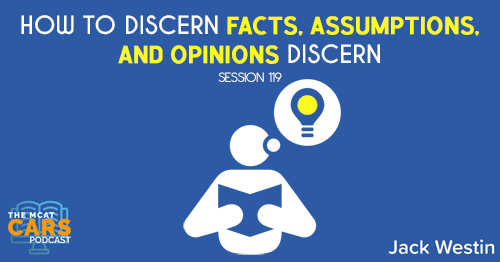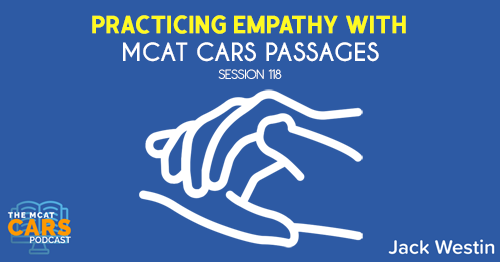Apple Podcasts | Google Podcasts

Session 83
The advent of podcasts offered listeners the opportunity to have thoughts without having to think. But is that a good thing?
Today, we’re diving into another passage with Jack Westin. Go sign up for their trial session to get a glimpse of their lessons. They teach you that CARS is technical so you have to be very careful. You have to know what to look for. There are rules to follow. Follow the rules and you’ll start understanding the passage and getting the questions right. The program they offer is a great foundation. It will give you a great idea of what CARS wants from your and how the course works.
Listen to this podcast episode with the player above, or keep reading for the highlights and takeaway points.
Link to the article:
https://reallifemag.com/podcast-passivity/
When wireless radio became a thing, people thought it was haunted. Even to those who knew better, the new media seemed spooky and spectral — all voices untethered from bodies, passing through walls. This was the 1920s. That events transpiring elsewhere could appear close — and in real-time — was thrilling, but also disconcerting. People had to recalibrate themselves to a whole new understanding of what it meant to hear voices. And though the listening apparatus could be switched off and on, the broadcast itself never went away, every still and silent moment now shivering with currents and vibrations. “Wireless is a permanent guest,” wrote media theorist Rudolph Arnheim in 1934. There was something in the air.
The radio was penetrative. It got inside a person’s home, trespassing personal property like it was nothing. It made borders, privacy, categorical distinctions (all Victorian and Edwardian staples) into a joke. In the UK, the men (yes, they were all men) who founded the BBC in 1922 saw themselves as swashbuckling pioneers, pushing into the nation’s living rooms on a mission to entertain, but also to raise better, more enlightened citizens. In order to do so, they had to meet people where they literally, physically were. “It is nothing to create a studio atmosphere,” BBC exec C.A. Lewis wrote in 1924, reflecting on the corporation’s first year and declaring its manifesto for the future, “The programme has got to get into the home atmosphere.”
Radio took a singular event — a performance, an announcement, a piece of art — and sent it rippling into the world. Writing in 1921, the Russian futurist Velimir Khlebnikov predicted a world in which the radio would become a kind of “spiritual sun” and “unite all mankind.” Even to those with a less lofty vision, the mass quality of the media was not lost. “From palace to slum people are listening. It is the most democratic form of entertainment ever invented by man,” C.A. Lewis declared.
It feels a little facile to point out that in the digital age, the “broad” cast of radio has been stuffed into the singular, contained unit of the “pod.” That the metaphor is obvious doesn’t make it untrue. It also seems worth pointing out how the podcast (a portmanteau of iPod and broadcast) is fundamentally yoked to Apple products, whose dominance often seems like some kind of dystopic punchline about what it costs to be the same kind of special as everybody else. When you think of a podcast listener, tell me you don’t picture a person whose ears are stuffed shut with little white buds: the now-universal sign for “I’m not listening.” Or, rather, “I’m not listening to you.”
Like music, podcasts neither require nor encourage you to stop whatever else you’re doing in order to enjoy them; they are designed, quite beautifully, to be palimpsestic, a soundscape ready to track over just about any non-verbal activity. But where music might attach to your inner narrative and drag the tone and emotional tenor up and down like a movie score, podcasts are a direct delivery system for narrative and chatter itself.
In that way, they’re not so different from old-school radio, except that the wild increase in portability is a game-changer. The radio needled at a 20th century crisis of boundaries by admitting public experiences into private spaces. Podcasts have turned this inside out, allowing us to have private experiences as we go about in public. If to the turn-of-the-century listener the presence of the radio seemed like a haunting, in the age of podcasting, it’s more like we’re the ghosts — floating through the world in a fog of semi-presence, both deeply engaged and fundamentally checked out.
Listening to a podcast while you go about your life is an act of almost literal dislocation, allowing a person to essentially perceive themselves in two places at once. The disjunct is only reconciled in the experience, memory, and body of the listener. The result is something rich and singular and unrepeatable — something that’s happened just to you.
[04:43] Paragraph 1, Sentence 1
When wireless radio became a thing, people thought it was haunted.
Jack says:
The author is saying that people thought wireless radio was haunted.
[05:09] Paragraph 1, Sentence 2
Even to those who knew better, the new media seemed spooky and spectral — all voices untethered from bodies, passing through walls.
Jack says:
It’s highlighting why people were haunted by these voices not coming from bodies and just kind of passing through everything.
[05:31] Paragraph 1, Sentence 3
This was the 1920s.
Jack says:
We’re given a time period here, which was 100 years ago.
[06:09] Paragraph 1, Sentence 4
That events transpiring elsewhere could appear close — and in real-time — was thrilling, but also disconcerting.
Jack says:
There are things happening in different areas. The way the sentence was worded was really off putting, but you plow through like that. So just keep going because maybe it makes more sense as you keep reading the sentence.
[06:34] Paragraph 1, Sentence 5
People had to recalibrate themselves to a whole new understanding of what it meant to hear voices.
Jack says:
The author here is just saying that people had to just reimagine that hearing a voice probably before this meant that somebody was right there. They had to understand that there wasn’t somebody there.
[07:13] Paragraph 1, Sentence 6
And though the listening apparatus could be switched off and on, the broadcast itself never went away, every still and silent moment now shivering with currents and vibrations.
Jack says:
The author is talking about the radio waves itself, the broadcast itself never going away.
[07:27] Paragraph 1, Sentence 7
“Wireless is a permanent guest,” wrote media theorist Rudolph Arnheim in 1934.
Jack says:
Now, we’re given the name of the media theorist and wonder what that is. This is before the advent of the TV. So it’s like our first kind of a relationship with ongoing entertainment outside of the newspaper that was a one time thing when you pick up the newspaper. Now, it’s this constant airwave going on.
[08:18] Paragraph 1, Sentence 8
There was something in the air.
Jack says:
This sentence is straightforward.
[08:20] Paragraph 2, Sentence 1
The radio was penetrative.
Jack says:
It’s everywhere. So it’s probably penetrating into your homes. It’s going everywhere.
[08:55] Paragraph 2, Sentence 2
It got inside a person’s home, trespassing personal property like it was nothing.
Jack says:
So it’s penetrating in a nice, visual way. It doesn’t care about boundaries.
[09:09] Paragraph 2, Sentence 3
It made borders, privacy, categorical distinctions (all Victorian and Edwardian staples) into a joke.
Jack says:
The author is pointing out that the radio waves just didn’t care about anything. It just went wherever it wanted.
[09:27] Paragraph 2, Sentence 4
In the UK, the men (yes, they were all men) who founded the BBC in 1922 saw themselves as swashbuckling pioneers, pushing into the nation’s living rooms on a mission to entertain, but also to raise better, more enlightened citizens.
Jack says:
We’re given a little bit of history here of the BBC and what that was, who started it, and why they started. You don’t need to know that the BBC was started by men or what they’re trying to do. Knowing that it’s penetrative is the most important thing.
[10:08] Paragraph 2, Sentence 5
In order to do so, they had to meet people where they literally, physically were.
Jack says:
It’s talking about that penetration just going to everyone.
[10:20] Paragraph 2, Sentence 6
“It is nothing to create a studio atmosphere,” BBC exec C.A. Lewis wrote in 1924, reflecting on the corporation’s first year and declaring its manifesto for the future, “The programme has got to get into the home atmosphere.”
Jack says:
Lewis is talking about penetrating and it has to get into the home.
[10:50] Paragraph 3, Sentence 1
Radio took a singular event — a performance, an announcement, a piece of art — and sent it rippling into the world.
Jack says:
It’s everywhere.
[11:16] Paragraph 3, Sentence 2
Writing in 1921, the Russian futurist Velimir Khlebnikov predicted a world in which the radio would become a kind of “spiritual sun” and “unite all mankind.”
Jack says:
Now, we have another person here, this Russian futurist, talking about spiritual sun. It’s about how it can penetrate and go everywhere. And he’s describing the radio.
[12:00] Paragraph 3, Sentence 3
Even to those with a less lofty vision, the mass quality of the media was not lost.
Jack says:
Even people who didn’t have this kind of feature, a spiritual sun vision, the people understood that there was this quality to the media.
[12:22] Paragraph 3, Sentence 4
“From palace to slum people are listening.
Jack says:
It’s showing that everyone is listening and it’s penetrating everywhere.
[12:32] Paragraph 3, Sentence 5
It is the most democratic form of entertainment ever invented by man,” C.A. Lewis declared.
Jack says:
Lewis is obviously a fan of the radio and the radio waves. It does convey the idea of unity. Whether you’re in the palace or a slum person or whatever they called it. They also said it’s a democratic form of entertainment. It sounds like a good thing based on how the author describes it.
[13:10] Paragraph 4, Sentence 1
It feels a little facile to point out that in the digital age, the “broad” cast of radio has been stuffed into the singular, contained unit of the “pod.”
Jack says:
The author is talking about podcasts now. So the author here is switching from this broadcast to now podcasts.
[13:37] Paragraph 4, Sentence 2
That the metaphor is obvious doesn’t make it untrue.
Jack says:
The metaphor here being the pod and comparing those. One is wide and one is not content when it’s contained.
[14:07] Paragraph 4, Sentence 3
It also seems worth pointing out how the podcast (a portmanteau of iPod and broadcast) is fundamentally yoked to Apple products, whose dominance often seems like some kind of dystopic punchline about what it costs to be the same kind of special as everybody else.
Jack says:
We’re given a little bit of a history lesson of podcasts and where the name comes from and how it’s tied with Apple products and how that is a punchline about how we’re all the same.
The word dystopic punchline, makes it seem like the author is not a fan of Apple’s dominance. It’s slightly annoyed by the fact that you have to use an Apple product to list. We all know that’s not the case really.
But Apple, although they didn’t invent the podcast, they popularized it. But the author’s mocking or suggesting that you have to be every like everyone else. Especially in the fact that you’re using an Apple product to listen to a podcast, so it doesn’t seem like it’s as universal as radio. It doesn’t seem like it’s as penetrative as radio.
[16:13] Paragraph 4, Sentence 4
When you think of a podcast listener, tell me you don’t picture a person whose ears are stuffed shut with little white buds: the now-universal sign for “I’m not listening.”
Jack says:
The author here is just painting this negative picture of podcast listeners like they just don’t care and they’re not listening.
[16:41] Paragraph 4, Sentence 5
Or, rather, “I’m not listening to you.”
Jack says:
So when you’re listening to podcasts, you’re not necessarily listening to other people around you.
[16:55] Paragraph 5, Sentence 1
Like music, podcasts neither require nor encourage you to stop whatever else you’re doing in order to enjoy them; they are designed, quite beautifully, to be palimpsestic, a soundscape ready to track over just about any non-verbal activity.
Jack says:
The author here is just saying that music and podcasts are very similar in that, how we can listen to them while we’re doing other stuff. So imagine podcasts like music.
[17:30] Paragraph 5, Sentence 2
But where music might attach to your inner narrative and drag the tone and emotional tenor up and down like a movie score, podcasts are a direct delivery system for narrative and chatter itself.
Jack says:
The author here is showing how they’re different. Music is messing with your emotions, making them up and go down. And podcasts are a delivery system for narrative, chatter, and talking.
[18:27] Paragraph 6, Sentence 1
In that way, they’re not so different from old-school radio, except that the wild increase in portability is a game-changer.
Jack says:
Now, we’re back to radio here and comparing podcasts or radio with just delivering narrative and chatter. The whole point that the author has been making is that podcasts are a little different than radio.
[19:18] Paragraph 6, Sentence 2
The radio needled at a 20th century crisis of boundaries by admitting public experiences into private spaces.
Jack says:
So the author here again is pointing out the penetrance of radio and how that was different. These public experiences are now going into private places.
[19:42] Paragraph 6, Sentence 3
Podcasts have turned this inside out, allowing us to have private experiences as we go about in public.
Jack says:
So listening to podcasts is a private experience even when you’re in public.
[20:05] Paragraph 6, Sentence 4
If to the turn-of-the-century listener the presence of the radio seemed like a haunting, in the age of podcasting, it’s more like we’re the ghosts — floating through the world in a fog of semi-presence, both deeply engaged and fundamentally checked out.
Jack says:
The author is painting this negative picture of a podcast listener. We’re engaged deeply into the podcast, but we’re just kind of checked out with everything else going on. Checkout is slightly negative but it’s not extremely critical. It’s not extremely negative. It’s not like a hating kind of attitude.
In this case, you know, we have to be careful. We can’t bring in our biases and our opinions on if someone attacks podcasts.The author’s definitely slightly annoyed, but it’s not drastic.
The main idea of this paragraph is that the author is talking about radios and podcasts. And then they compare the two. That’s the whole point of the passage. And you have to pick up on that. They give you so many opportunities to pick up on that. The radio is penetrative and universal. The radio goes to private spaces. The podcast makes you more private in public spaces. That’s the main idea. And you should use that when you answer their questions because they could ask 100 questions on that.
[22:51] Paragraph 7, Sentence 1
Listening to a podcast while you go about your life is an act of almost literal dislocation, allowing a person to essentially perceive themselves in two places at once.
Jack says:
This situation for podcast listeners where they’re in two places at once. They’re there in their head listening to the podcast, but they’re out in public as well. That’s opposite of a radio where you’re with everyone thinking and seeing the same thing at the same time.
[23:27] Paragraph 7, Sentence 2
The disjunct is only reconciled in the experience, memory, and body of the listener.
Jack says:
The listeners experiencing this are the only ones experiencing this.
[23:45] Paragraph 7, Sentence 3
The result is something rich and singular and unrepeatable — something that’s happened just to you.
Jack says:
So it’s happening just for that listener in that moment, listening to whatever they’re listening to.
[24:13] Main Idea
We were given a little history lesson of radio and its penetrance and how it would go into your home and then using that to discuss podcasts and how similar to radio, it’s just chatter and conversations and not music. But unlike radio, how portable it is where we’re in the world of podcasts and out in the world, kind of being in two places at once, and only happening to that person.
[24:54] Sample Question
The author’s attitude towards the radio can best be described as:
(A) intrigued
(B) slightly annoyed
The key to this is paying attention to what they’re referring to. Because the author’s attitude depends on the specific thing that the author mentioned. So you have to be very careful. And it’s about the radio so it’s actually positive. If it’s about the podcasts, it’s a little negative, not totally negative. But at the end of the day, the author’s trying to describe that the podcast is an inverted form of radio that profoundly affects our human experience. It changes the way we interact with people. It’s different than radios.
'You have to be very careful with the exact words that they use. That's how they trick you.'Click To TweetIt’s very common for these kinds of passages that the AAMC will give you an analogy question. And they’ll say which of these best resembles the radio and the podcasts based on how the author described them.
But you’d have to know that radios are everywhere. The podcast is not everywhere. You would have to pick two things that kind of resembled each one. And you have to know the right order. It’s with respect to the radio and the podcast. It has to be in that order. So they’ll say, blank and blank. And the first blank has to go with radio, and the second blank has to go with the podcast.
Links:
Link to the article:
SEARCH SITE
SEARCH SITE
LISTEN FOR FREE











